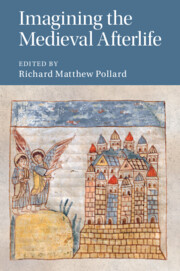Book contents
- Imagining the Medieval Afterlife
- Cambridge Studies in Medieval Literature
- Imagining the Medieval Afterlife
- Copyright page
- Contents
- Figures
- Contributors
- Preface and Acknowledgements
- Abbreviations
- Imagining the Medieval Afterlife: Introduction
- Part I Chronological Surveys
- Part II Theological Perspectives
- Chapter 8 Purgatory’s Intercessors: Bishops, Ghosts, and Angry Wives
- Chapter 9 The Theology of the Afterlife in the Early Middle Ages, c. 400–c. 1100
- Chapter 10 Afterdeath Locations and Return Appearances, from Scripture to Shakespeare
- Part III Artistic Impressions
- Part IV Notable Authors and Texts
- Bibliography
- Index
- Cambridge Studies in Medieval Literature
Chapter 8 - Purgatory’s Intercessors: Bishops, Ghosts, and Angry Wives
from Part II - Theological Perspectives
Published online by Cambridge University Press: 07 December 2020
- Imagining the Medieval Afterlife
- Cambridge Studies in Medieval Literature
- Imagining the Medieval Afterlife
- Copyright page
- Contents
- Figures
- Contributors
- Preface and Acknowledgements
- Abbreviations
- Imagining the Medieval Afterlife: Introduction
- Part I Chronological Surveys
- Part II Theological Perspectives
- Chapter 8 Purgatory’s Intercessors: Bishops, Ghosts, and Angry Wives
- Chapter 9 The Theology of the Afterlife in the Early Middle Ages, c. 400–c. 1100
- Chapter 10 Afterdeath Locations and Return Appearances, from Scripture to Shakespeare
- Part III Artistic Impressions
- Part IV Notable Authors and Texts
- Bibliography
- Index
- Cambridge Studies in Medieval Literature
Summary
In the early medieval West, purgatory was an idea in the process of formation in Christian thought. Formal teachings on purgatory were long preceded by stories in which imperilled souls sought and received intercession that allowed them to repent and rest in peace. Early medieval writings show that a wide variety of people could intercede for both the living and the dead. Ghost stories, family stories, and the idea of the communion of saints combined to consolidate purgatory and post-mortem purification of souls in medieval Christian thought.
- Type
- Chapter
- Information
- Imagining the Medieval Afterlife , pp. 133 - 152Publisher: Cambridge University PressPrint publication year: 2020

